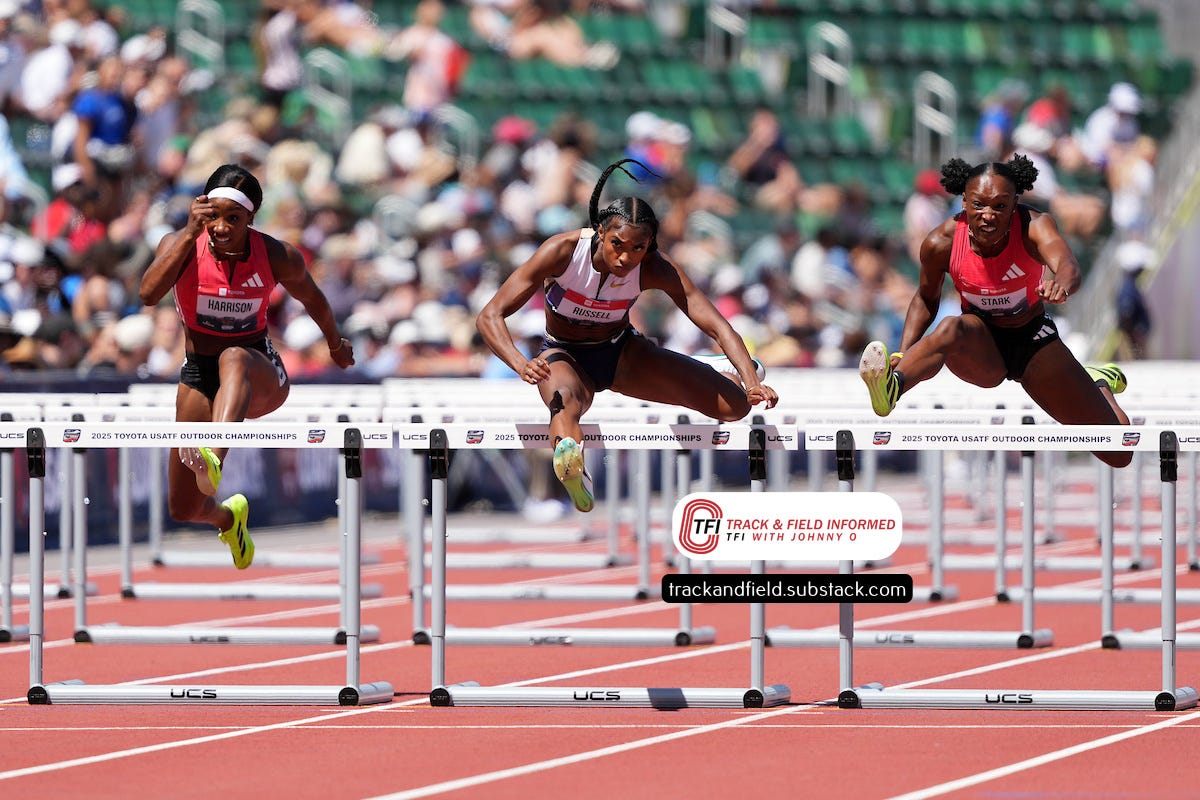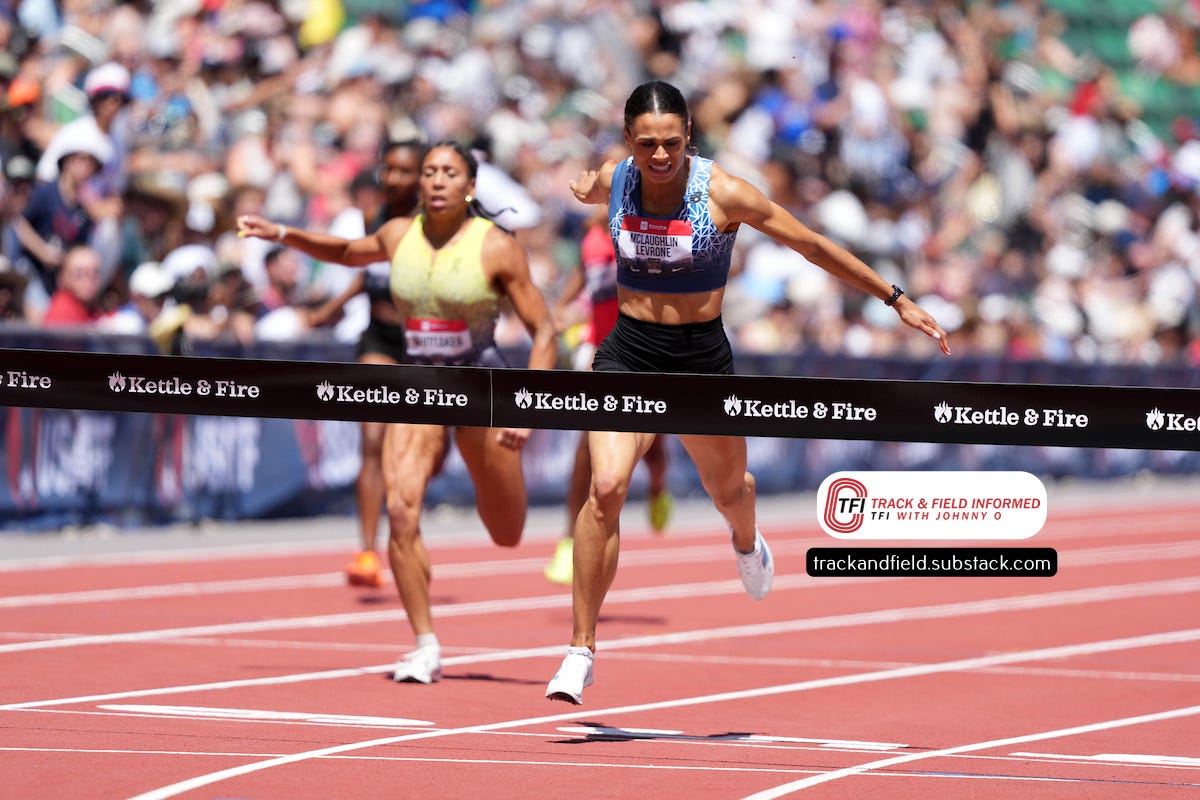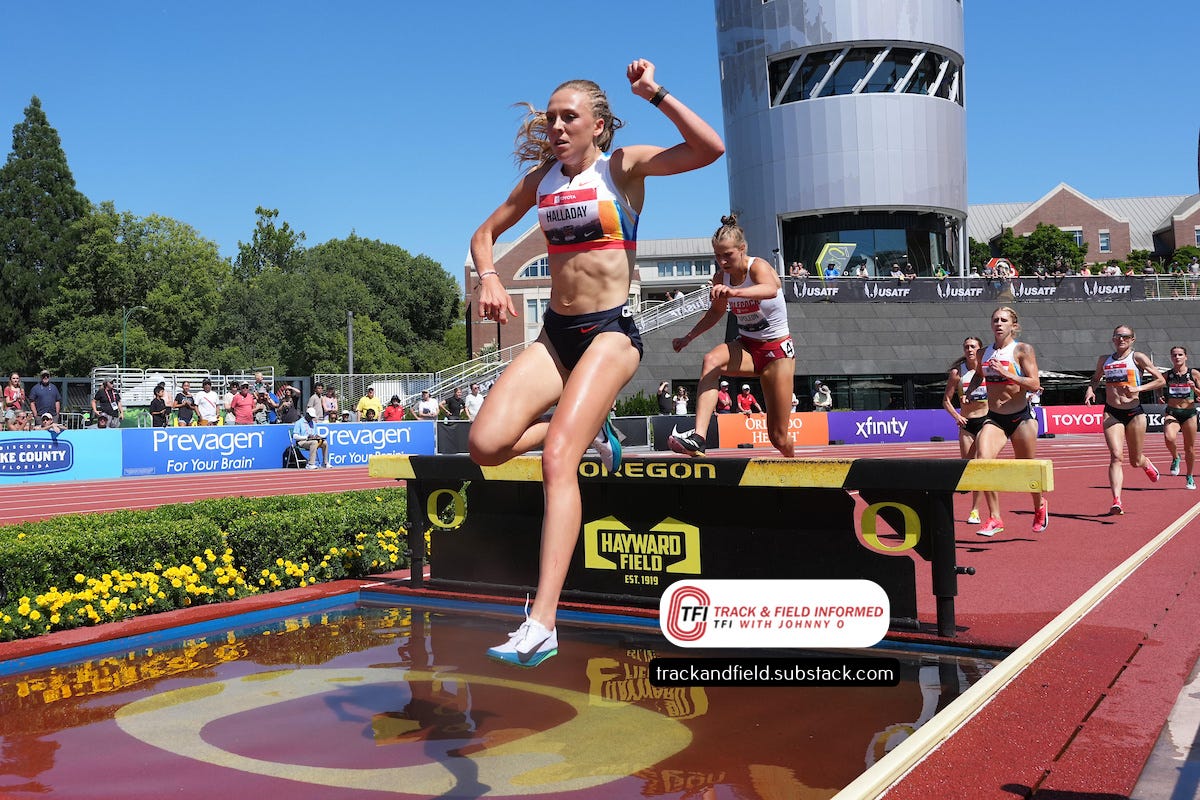Russell returns to form in USATF Champs
Olympic gold medalist wins 100-meter hurdles in 12.22 following injury setback

Three months to the day after becoming the second-fastest woman in history in the women’s 100-meter hurdles, Masai Russell might have topped that performance in the USA Track & Field Outdoor Championships in Eugene, Oregon, on Saturday.
Although her winning time of 12.22 seconds at the University of Oregon’s Hayward Field was five hundredths of a second slower than her 12.17 clocking in a Grand Slam Track meet in Miramar, Florida, on May 2, it was the seventh-fastest clocking in history and it came about an hour and a half after she had won her first-round heat in 12.25, which was tied for the 12th-quickest effort ever.
Only Tobi Amusan has had a better one-day double than Russell, as the Nigerian had lowered the world record to 12.12 in a semifinal of the 2022 World Athletics Championships, which were also held at Hayward Field, before winning the final in a wind-aided 12.06.
“I just take advantage of the opportunity,” Russell told Lewis Johnson of NBC Sports when he asked her about her performance in the final. “I take advantage of the moment. These women bring the best out of me as I continue to say, time and time again.”
Russell, whose only two victories last year came in the U.S. Olympic Team Trials and the Olympic Games, defeated a crack field on Saturday as Grace Stark finished second in 12.31, followed by Alaysha Johnson in 12.36, Keni Harrison in 12.37, Tonea Marshall in 12.40, and Alia Armstrong in 12.55.
Stark had lowered her personal best to 12.21 in the Meeting de Paris meet in the French capital on June 20 and Johnson had turned in an impressive double in the Ed Murphey Classic in Memphis, Tennessee, on July 12 when she produced times of 12.27 and 12.32 in a pair of races.
While the 12.27 clocking was wind-aided, the wind reading for the race was 2.1 meters-per-second, just above the maximum of 2.0 allowed for record purposes.
Despite those impressive performances, Russell dominated Saturday’s final as she beat everyone to the first of 10 hurdles and really took control of the race around the fourth barrier.
In contrast to Stark and Johnson, who leaned heavily at the finish line in an effort to give themselves the all-important second and third berths on a U.S. team that will compete in the World championships in Tokyo from Sept. 13-21, Russell had a big enough lead that she was able to win the race by running through the tape and not having to employ a big dip to get the fastest possible time.
Her winning effort was doubly impressive because she had finished fourth, fourth, and second in a trio of races in July after an ankle injury had sidelined her not long after she had lowered her personal best from 12.25 to 12.17 in the Grand Slam meet in Miramar.
Russell had never experienced a serious injury before so it was completely unnatural for her to sit out the remainder of May and the entirety of June before she ran 12.50 to finish fourth in the Prefontaine Classic in Eugene on July 5.
That was followed by a fourth-place finish in 12.57 in the Herculis EBS Diamond League meet in Monaco six days later before she ran 12.69 to place second in a meet in Brescia, Italy, four days after that.
She then returned home and her preparation for the USATF meet appears to have been spot on as her 12.25 and 12.22 clockings on Saturday made her the first woman to have run 12.25 or faster four times during their career.
“I’m just glad I was able to show up,” she told Johnson, “especially coming off the injury and to get a big time and another win.”
Russell was one of the six women to win events on Saturday.
The others were Sydney Mclaughlin-Levrone in the 400, Chase Jackson in the shot put, Lexy Halladay-Lowry in the 3,000-meter steeplechase, Nikki Hiltz in the 1,500, Jasmine Moore in the triple jump, and Lauren Harris in the 20-kilometer walk.
McLaughlin-Levrone, the two-time Olympic gold medalist and the six-time world record setter in the 400 hurdles, chose to run in the 400 in the USATF meet and she had a large margin of victory as her 48.90 clocking left her well ahead of second-place Isabella Whittaker in 49.59 and third-place Aaliyah Butler of the University of Georgia in 49.91.
Lynna Irby-Jackson finished fourth in 50.06, with Alexis Holmes fifth in 50.33 and Britton Wilson sixth in 50.88.
McLaughlin-Levrone’s time was the third fastest of her career and the sixth fastest in U.S. history, and though many fans had expected her to break the national record of 48.70 set by Santa Richards-Ross in 2006, she told Johnson she was happy with her effort as it gave her more experience in an event that is still relatively new to her.
In an usatoday.com post she was quoted as saying she decided to run the 400 instead of the 400 hurdles in the national championships because “I wanted to challenge myself. I felt like this is the year I wanted to step out of the box and really push myself in a different way.”

Jackson did not have to compete in the USATF meet to make the U.S. team for the World championships because she had a bye into this year’s global title meet because she won the 2023 meet in Budapest, Hungary. However, she had performed extremely well in June and July and was intent on producing the first 21-meter (68 feet 10¾ inches) put of her career after raising her national record to 20.95 (68-8¾) in the Iron Wood Throws Classic in Rathdrum, Idaho, on June 28, and following that with a 20.94 (68-8½) best in the Prefontaine Classic a week later.
Although she fell short of her lofty goal, her top put of 20.84 (68-4½) was nearly a meter farther than runner-up Maggie Ewen’s season best of 19.94 (65-5).
Jessica Ramsey placed third at 19.56 (64-2¼), followed by Olympic fourth-place finisher Jaida Ross at 19.33 (63-5) and Jessica Woodard at 19.10 (62-8).
As she often does, Jackson produced her best put in the first round and she followed that with a 20.56 (67-5½) effort in the second before fouling on her third and fourth attempts.
She then hit 20.21 (66-3¾) and 20.50 (67-3¼) on her final two puts while winning her third national title in the last four years.
Halladay-Lowry won the steeplechase in 9:09.14 after surging into the lead heading down the backstretch for the second to last time.
Courtney Wayment, who had finished 12th in the Olympic Games in Paris last summer, led the field through the first kilometer in a solid 3:02.41, but the pace slowed during the ensuring kilometer and Angelina Napoleon of North Carolina State University was in the lead when she went through 2,000 meters in 6:12.47.
The lead pack still consisted of seven runners with two laps left in the race, but Halladay-Lowry broke things up with her bold move and she had a lead of about 10 meters over second-place Napoleon at the bell.
Napoleon, who started her sophomore season with a personal best of 9:54.08 before finishing third behind Alabama sophomore Doris Lemngole and BYU senior Halladay-Lowry in the NCAA championships, made up some ground on Halladay-Lowry heading down the backstretch for the final time. But the gap between them soon began to widen and she placed second in 9:10.96, followed by Kaylee Mitchell in 9:11.36.
Krissy Gear placed fourth in a personal best of 9:11.64 and Olivia Markezich also ran a career best with her 9:14.26 clocking in fifth. Wayment finished sixth in 9:17.94.
“I can’t put this into words,” Halladay-Lowry told Johnson when he asked her what her victory meant to her. “This has been years in the making. I can’t thank coach (Diljeet Taylor) enough.”
Hiltz won their third consecutive national title in the 1,500 after running just off the lead pace for much of the race before stepping on the accelerator heading down the backstretch for the final time and moving past first-place Sinclaire Johnson after entering the home straightaway.
While her winning time of 4:03.15 was nothing spectacular, Hiltz ran the final 100 meters of the race in 14.19 seconds, the last 300 in 43.34, and the concluding 400 in 58.67.
Johnson, who had lowered the U.S. record in the mile to 4:16.32 while finishing fourth in a Diamond League meet in London on July 19, placed second in 4:03.77, followed by Emily Mackay in 4:04.38.
Heather MacLean finished fourth in 4:05.60, with a fast-closing Dani Jones fifth in 4:05.62. Laurie Barton, who had led the field through 400 meters in 67.88 and 800 in 2:15.90, placed sixth in 4:06.38.

Moore won her second consecutive title in the triple jump after she had finished a disappointing fifth in the long jump on Thursday.
The Olympic bronze medalist in long jump and triple jump won the latter event on Saturday with a season best of 14.68 (48-2) that was more than three feet further than runner-up Agur Dwol’s top mark of 13.76 (45-1¾).
Euphenie Andre was third at 13.64 (44-9), followed by Arianna Fisher at 13.44 (44-1¼).
Moore had bounded 14.29 (46-10¾) on her first attempt before hitting 14.09 (46-2¾) on her second, 14.26 (46-9½) on her third, and 13.99 (45-10¾) on her fourth. She then leaped 14.23 (46-8¼) in the fifth round before getting her season best of 14.68 (48-2) on the final jump of the competition.
Harris was a runaway winner of the 20k walk as her time of 1 hour 31 minutes 23.7 seconds left her more than eight and a half minutes ahead of second-place Maria Michta-Coffey, who clocked 1:39:56.4.
She was followed by Katie Burnett in 1:40:35.2.
Harris had a 20-second lead over Michta-Coffey after the first kilometer of the race and her advantage was nearly a minute and 45 seconds when she came through five kilometers in 22:56.5 and it was more than three and a half minutes when she clocked 45:46.7 at the midway point of the contest.
In the only women’s preliminary event held on Saturday, Dalilah Muhammad, Anna Cockrell, and Jasmine Jones won their respective first-round heats of the 400 hurdles in times of 53.80, 53.97, and 54.36, respectively.
Due to a small field of 17 competitors, the first-round heats functioned as semifinals for the final.
While Cockrell was the silver medalist in the Olympics in Paris and Jones finished fourth, the 35-year-old Muhammad is having a resurgent season after being slowed by injuries and illness in 2023 and ‘24.
She won the Olympic title in 2016 and the World championships in 2019 before finishing second to Sydney McLaughlin in the 2021 Games in Tokyo.
The four-day meet will conclude today, with the women’s pole vault and discus kicking off the festivities at 3 p.m., Eastern Daylight Time.
Track events will start at 3:05 p.m. with the first-round heats of the men’s 200 meters.
You can click here for an event schedule and results of the meet.

